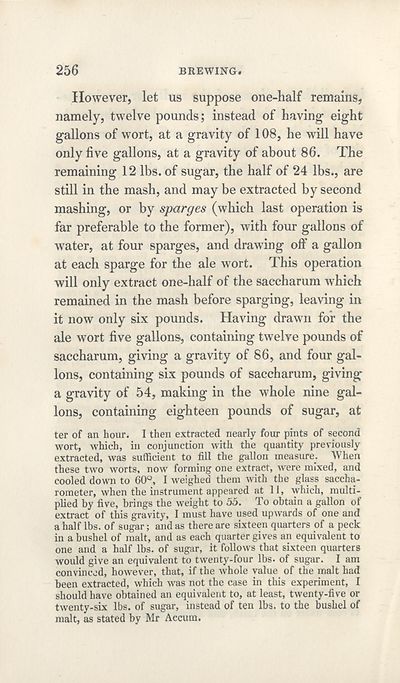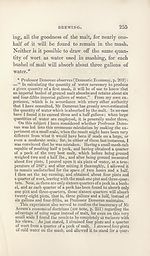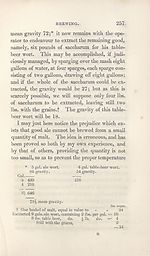Download files
Complete book:
Individual page:
Thumbnail gallery: Grid view | List view

256
BREWING.
However, let us suppose one-half remains,
namely, twelve pounds; instead of having eight
gallons of wort, at a gravity of 108, he will have
only five gallons, at a gravity of about 86. The
remaining 12 lbs. of sugar, the half of 24 lbs., are
still in the mash, and may be extracted by second
mashing, or by sparges (which last operation is
far preferable to the former), with four gallons of
water, at four sparges, and drawing off a gallon
at each sparge for the ale wort. This operation
will only extract one-half of the saccharum which
remained in the mash before sparging, leaving in
it now only six pounds. Having drawn for the
ale wort five gallons, containing twelve pounds of
saccharum, giving a gravity of 86, and four gal¬
lons, containing six pounds of saccharum, giving
a gravity of 54, making in the whole nine gal¬
lons, containing eighteen pounds of sugar, at
ter of an hour. I then extracted nearly four pints of second
wort, which, in conjunction with the quantity previously
extracted, was sufficient to fill the gallon measure. When
these two worts, now forming one extract, were mixed, and
cooled down to 60°, I weighed them with the glass saccha-
rometer, when the instrument appeared at 11, which, multi¬
plied by five, brings the weight to 55. To obtain a gallon of
extract of this gravity, I must have used upwards of one and
a half lbs. of sugar; and as there are sixteen quarters of a peck
in a bushel of malt, and as each quarter gives an equivalent to
one and a half lbs. of sugar, it follows that sixteen quarters
would give an equivalent to twenty-four lbs. of sugar. I am
convinced, however, that, if the whole value of the malt had
been extracted, which was not the case in this experiment, I
should have obtained an equivalent to, at least, twenty-five or
twenty-six lbs. of sugar, instead of ten lbs. to the bushel of
malt, as stated by Mr Accum.
BREWING.
However, let us suppose one-half remains,
namely, twelve pounds; instead of having eight
gallons of wort, at a gravity of 108, he will have
only five gallons, at a gravity of about 86. The
remaining 12 lbs. of sugar, the half of 24 lbs., are
still in the mash, and may be extracted by second
mashing, or by sparges (which last operation is
far preferable to the former), with four gallons of
water, at four sparges, and drawing off a gallon
at each sparge for the ale wort. This operation
will only extract one-half of the saccharum which
remained in the mash before sparging, leaving in
it now only six pounds. Having drawn for the
ale wort five gallons, containing twelve pounds of
saccharum, giving a gravity of 86, and four gal¬
lons, containing six pounds of saccharum, giving
a gravity of 54, making in the whole nine gal¬
lons, containing eighteen pounds of sugar, at
ter of an hour. I then extracted nearly four pints of second
wort, which, in conjunction with the quantity previously
extracted, was sufficient to fill the gallon measure. When
these two worts, now forming one extract, were mixed, and
cooled down to 60°, I weighed them with the glass saccha-
rometer, when the instrument appeared at 11, which, multi¬
plied by five, brings the weight to 55. To obtain a gallon of
extract of this gravity, I must have used upwards of one and
a half lbs. of sugar; and as there are sixteen quarters of a peck
in a bushel of malt, and as each quarter gives an equivalent to
one and a half lbs. of sugar, it follows that sixteen quarters
would give an equivalent to twenty-four lbs. of sugar. I am
convinced, however, that, if the whole value of the malt had
been extracted, which was not the case in this experiment, I
should have obtained an equivalent to, at least, twenty-five or
twenty-six lbs. of sugar, instead of ten lbs. to the bushel of
malt, as stated by Mr Accum.
Set display mode to:
![]() Universal Viewer |
Universal Viewer | ![]() Mirador |
Large image | Transcription
Mirador |
Large image | Transcription
| Antiquarian books of Scotland > Occupations > British wine-maker, and domestic brewer > (294) |
|---|
| Permanent URL | https://digital.nls.uk/126003449 |
|---|
| Description | Thousands of printed books from the Antiquarian Books of Scotland collection which dates from 1641 to the 1980s. The collection consists of 14,800 books which were published in Scotland or have a Scottish connection, e.g. through the author, printer or owner. Subjects covered include sport, education, diseases, adventure, occupations, Jacobites, politics and religion. Among the 29 languages represented are English, Gaelic, Italian, French, Russian and Swedish. |
|---|

